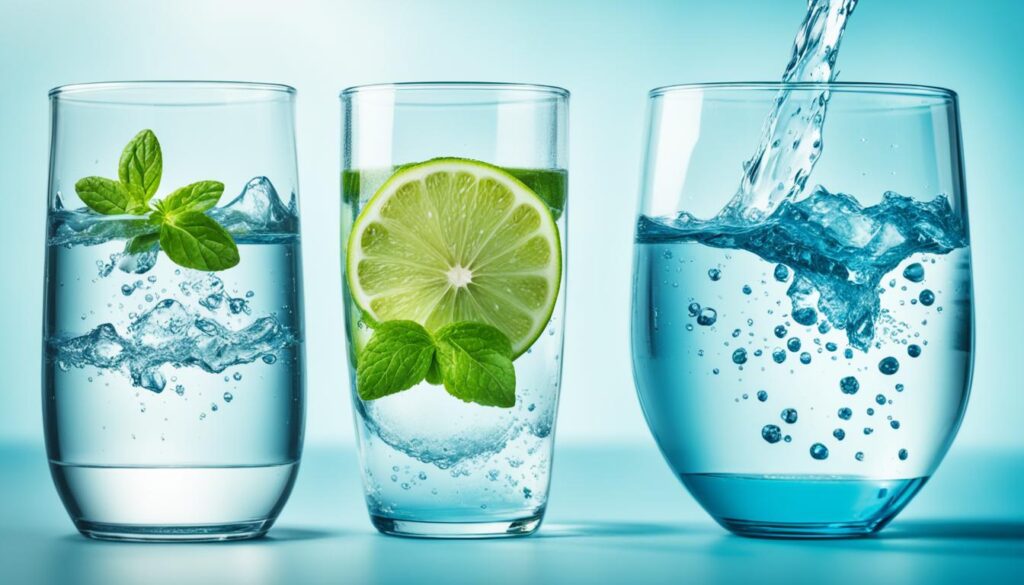Water fasting is an ancient practice that many cultures have embraced. It’s a powerful way to detox naturally for overall health. People today are coming back to it for its benefits like losing weight, boosting metabolism, and detoxing the body. This method involves not eating for 24 to 72 hours and only drinking water. It lets the body use its own powers to renew and detox itself.
Religions like Buddhism, Islam, and certain Chinese traditions have long valued fasting. They see it as important for both the mind and body. Now, people also see it as a way to lose weight and even trigger a process called autophagy. This is when the body starts to clean and renew itself at a cellular level.
Key Takeaways
- Water fasting typically spans 24 to 72 hours.
- It may prompt significant health benefits, such as improved blood pressure and lower triglyceride levels.
- Studies suggest fasting can enhance insulin and leptin sensitivity.
- Research indicates a possibility of improved chemotherapy effectiveness by suppressing certain cancer cell genes.
- Many cultural practices, especially within Buddhism, Islam, and certain Chinese traditions, incorporate fasting.
- Autophagy stimulated during water fasting supports cellular detoxification and regeneration.
Introduction to Water Fasting and Detoxification
Water fasting is a powerful way to cleanse the body. It involves drinking only water for a period, usually one to three days. This method is known for its benefits like weight loss, better metabolism, and improved digestion. Let’s explore what water fasting is and its origins.
What is Water Fasting?
Water fasting means drinking only water and skipping all other foods and drinks. It helps the body get rid of toxins and boosts health. Many people find it simple yet effective for their health, leading to better weight control and skin hydration.
It’s key to remember to drink eight glasses of water a day to stay hydrated and support detox. This helps us understand how water fasting can positively impact our health.
History and Origins of Fasting
Fasting has been around for thousands of years. Many cultures and religions have used it for spiritual and health reasons. The ancient Greeks and Romans fasted to clear their minds and bodies.
Today, fasting is popular for its health perks and as part of detox plans. Methods like intermittent and water fasting help improve health. However, some claims about detox water, like balancing body pH or improving skin, lack strong evidence.
Before starting water fasting, it’s wise to talk to a healthcare professional. Without guidance, it can lead to dehydration and health problems. Understanding water fasting’s history and how to do it safely can help us use it wisely.
For more details on the effects and benefits, check out the Water Diet Benefits link. It offers a lot of information on this topic.
Health Benefits of Water Fasting
Water fasting is getting more attention for its health perks. It can improve our well-being in many ways. Let’s see how it can help us.

Weight Loss and Metabolism Boost
Water fasting is known for helping with weight loss. When we eat less, our body uses fat for energy. This not only helps us lose weight but also boosts metabolism.
During fasting, our bodies increase human growth hormone levels. This helps burn more fat and speeds up our metabolism. It’s a great way to keep losing weight.
Reduced Risk of Chronic Conditions
Water fasting can lower the risk of chronic diseases. It does this by reducing blood pressure, lowering blood sugar, and fighting inflammation. These changes can help prevent heart disease, type 2 diabetes, and other health problems.
It also makes our bodies more sensitive to insulin. This helps control blood sugar levels and can improve digestion. It gives our digestive system a break.
Cell Regeneration and Autophagy
Water fasting is good for our cells. It starts a process called autophagy, where our body gets rid of damaged cells and makes new ones. This helps clean out toxins and may lower cancer risk.
Autophagy and cell regeneration also make our cells work better. It’s like a refresh for our bodies.
Preparation for Water Fasting
Getting ready for water fasting is key to a smooth process. Following natural detox methods and holistic health tips helps a lot. Here are the steps to prepare for a water fast.
Steps to Prepare Your Body
Before a water fast, slowly change your diet to ease your body. Start by eating smaller meals for a few days or try partial-day fasting. Also, stop using stimulants like caffeine and toxins a week before to avoid withdrawal.
Eating more fruits and veggies and avoiding processed foods, too much salt, and sugar helps your body detox naturally. Remember, during a water fast, you should drink 2 to 3 liters of water daily.
Choosing the Right Time for a Fast
Choosing the right time for fasting is important. Pick a time when you’re not too busy or stressed. A 72-hour water fast every 2 to 3 months can help with detox or repair and lower the risk of chronic diseases.
Start by slowly getting into fasting with natural detox methods. This makes the transition easier and boosts your health. Studies show that fasting for 12 hours a day can improve digestion and detox.
Always pay attention to how you feel during a fast. If you feel weak, dizzy, or very tired, stop fasting to stay safe. Proper preparation lets you enjoy the benefits of water fasting safely, improving your overall health.
Water Fasting and Detoxification: How It Works
Water fasting helps our body cleanse itself by stopping food intake and using natural detox methods. When we fast, our body shifts to a state called ketosis. In ketosis, our body uses fat for energy, which helps detoxify and cleanse us. This process lowers blood sugar, cholesterol, triglycerides, insulin, and inflammation levels.
Ketosis also helps with weight loss and boosts detox enzymes in the liver, keeping it healthy. Water fasting encourages autophagy, a process where our cells repair and remove old or damaged parts. This can lower the risk of diseases like cancer and neurodegenerative disorders.
Here are some key facts about water fasting and health:
| Benefit | Impact |
|---|---|
| Weight Loss | Increased rate of fat oxidation and metabolic rate |
| Blood Pressure | Study shows a significant reduction in blood pressure for 90% of those with borderline hypertension |
| Diabetes Management | 90% of participants reduced diabetes medications after intermittent fasting |
| Heart Health | Fasting positively impacts high blood pressure, cholesterol, and obesity |
| Liver Function | Improved through autophagy and enhanced enzyme activity |
Using water fasting as a detox method can deeply cleanse your body. But, it’s key to know the pros and cons. Prolonged fasting without expert advice can lead to serious health issues like refeeding syndrome. So, always talk to a healthcare professional before starting a fasting plan.
Stages of Water Fasting: What to Expect
Starting a water fast takes you on a journey through different stages. Each stage has its own challenges and benefits. These phases help you understand the fasting benefits.
Initial 24 Hours
In the first day, your body uses glycogen for energy. Blood sugar levels go down, making the liver work harder. You might feel some changes as your body adjusts.
Mid-Fast (24-48 Hours)
As you move into the mid-fasting stage, your body starts using fat for energy. This stage brings many benefits like clearer thinking, less hunger, and detox. Fat cells release toxins, helping your lungs and colon.
Final Day (48-72 Hours)
In the last phase, your body is deeply cleansing. You’ll see changes like less inflammation, better insulin use, and sharper thinking. These changes show how powerful water fasting can be.
For a full guide on a 10-day fasting retreat, check out this guide. It covers each stage of water fasting and offers great insights.
Breaking Your Fast Safely
Ending a fast is as important as the fast itself. Knowing how to slowly add foods back into your diet helps you keep the detox benefits and improve digestion after the fast.
Gradual Reintroduction of Foods
When you start eating again after a long fast, do it slowly. Start with foods like broths, soft fruits, and vegetable juices. It’s best to skip heavy, carb-heavy meals that can quickly raise your blood sugar and undo your fast’s health benefits.
Adding fermented foods, leafy greens, cooked veggies, and healthy fats to your first meal can help with digestion and overall health.

Foods to Avoid After Fasting
When you start eating again, avoid foods that can upset your stomach. Stay away from processed snacks, sugary drinks, caffeine, and complex carbs. These can undo the detox effects and make digestion harder. Instead, try a Mediterranean diet with whole grains, plant-based foods, and healthy fats for a smoother transition.
| Recommended Foods | Foods to Avoid |
|---|---|
| Broths | Processed snacks |
| Soft fruits | Sugary drinks |
| Vegetable juices | Caffeine |
| Leafy greens | Complex carbs |
| Healthy fats | High-fat foods |
Following these tips helps us end our fast safely. It keeps the detox benefits and improve digestion, ensuring we stay healthy.
Potential Risks and Side Effects
Water fasting is popular for its health benefits, but it has risks too. It’s important to know these risks before trying it. Knowing about detox side effects can help reduce these risks.
Dehydration and Electrolyte Imbalance
Dehydration is a big risk of water fasting. Even though you drink water, not eating foods with water can lead to dehydration. Long fasting periods can also mess with your electrolyte balance.
Electrolytes like sodium, potassium, and magnesium are key for your body. Without the right balance, you could face serious issues like muscle cramps, dizziness, and heart problems.
Muscle Loss and Nutritional Deficiencies
Water fasting can also cause muscle loss and nutritional deficiencies. When your body doesn’t get enough calories, it may start breaking down muscle for energy. Also, not eating a varied diet can mean you’re missing out on important vitamins and minerals.
This can lead to long-term health problems. These side effects can cancel out the benefits of fasting.
Mental and Emotional Challenges
Water fasting can also affect your mind and feelings. Not eating enough and changing your eating habits can make you irritable, moody, and tired. These mental effects, along with physical side effects, can make fasting hard for many people.
Who Should Avoid Water Fasting?
Water fasting can be beneficial for health, but it’s not for everyone. Some medical conditions, age, and physical health affect if it’s safe. It’s important to know who should avoid this method.
Medical Conditions and Contraindications
People with chronic health issues should be careful with water fasting. Those with type 1 diabetes, heart disease, or severe nutrient lack should talk to a doctor first. Dr. Alan Goldhamer’s work at TrueNorth Health Center shows fasting can be helpful, but it must be done under a doctor’s watchful eye.
A study in the Journal of Manipulative and Physiological Therapeutics found big drops in blood pressure for those with high blood pressure. Pregnant or breastfeeding women and those with eating disorders should not try water fasting. It can be risky for both the mother and the baby.
Age and Physical Factors
Age is a key factor in who should not fast. People over 75 or those who are very thin should not fast. It can harm their muscle mass and nutritional balance.
Youth and teens can try fasting, but they should be watched closely, especially if fasting for a long time. A study with 1,422 people showed that even healthy adults need to be careful with fasting. They should watch their health closely during and after fasting.
Responsible fasting means we look out for our health. Knowing who should not fast due to health or age issues helps us make smart choices. We should always get advice from a professional to safely enjoy the benefits of fasting.
Source Links
- Water Fasting
- All about Detoxification through Fasting
- Detox Water Health Benefits and Myths
- Are Fasting Diets Safe and Effective?
- Detox or Cleanse? What To Know Before You Start
- Mya Care
- Top 5 Health Benefits Of Water Fasting
- Inside Detox: Expert Analysis of Water Fasting vs. Juice Fasting from
- The Truth about Fasts and Cleanses
- Does Fasting Release Toxins in the Body?
- What Is Water Fasting And Should You Try It?
- Water Fasting: How To Detox Safely And Effectively | Biostrap
- How I Did 40 and 21 Days of Water Fasting and My Insights Water Diet: I did not eat anything for forty days. By Hasan Ozalp
- The Benefits of a 6-Day Water Fast
- Intermittent Fasting? Here’s The Right Way To Break Your Fast
- No title found
- Here is what you need to know before you start fasting — Optimyze
- Juice cleanse: Benefits, risks, and effects
- Intermittent Fasting: Benefits, Side Effects, Quality of Life, and Knowledge of the Saudi Population
- How To Detox Your Body Safely, According To Experts
- Alan Goldhamer, dc: Water Fasting—The Clinical Effectiveness of Rebooting Your Body
- Is Water-Only Fasting Safe?
- 4 things you should know about cleanses, detoxes and fasts




